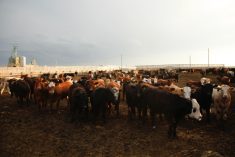MarketsFarm — ICE Futures canola held within a narrow range during the week ended Wednesday, as the market waits for fresh news to push it one way or the other.
“There are certainly some supportive elements underneath the marketplace,” said Mike Jubinville of MarketsFarm Pro, pointing to an upward trend in world vegetable oil prices and solid demand for canola oil.
“The demand elements on the canola market are good, but that demand is there only as long as canola is cheap,” he added, noting “canola is economically priced from an end-users’ perspective.”
Read Also

Alberta crop conditions improve: report
Varied precipitation and warm temperatures were generally beneficial for crop development across Alberta during the week ended July 8, according to the latest provincial crop report released July 11.
On the other side, Canada’s ongoing diplomatic dispute with China may be limiting some seed sales to the country, but Jubinville noted other countries were processing more Canadian canola and sending the oil to China. Canada was also shipping more canola oil itself.
With an estimated 10 per cent of Canada’s canola crop still unharvested, there are questions over how much there will be to market. However, Jubinville noted the country won’t be running out of canola, with a sizeable carryout of over three million tonnes still generally expected.
“Even though demand is strong, the uncertainties of the future limit the ability of the market to rally,” said Jubinville.
Until something changes, he expected canola would remain in a sideways trading pattern. The January contract settled Wednesday at $461.80 per tonne, right in the middle of its well established trading range between $450 and $475 per tonne.
With little on the horizon to push values out of that range, Jubinville recommend producers look for short-term pops in the futures, deferred delivery options and local basis opportunities.
— Phil Franz-Warkentin reports for MarketsFarm, a Glacier FarmMedia division specializing in grain and commodity market analysis and reporting.
















